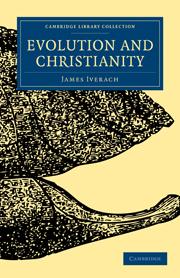Book contents
- Frontmatter
- Contents
- CHAPTER I EVOLUTION AND BEGINNINGS
- CHAPTER II EVOLUTION AND LAW
- CHAPTER III NATURE AND INTELLIGIBILITY
- CHAPTER IV THE STRIFE AGAINST PURPOSE
- CHAPTER V EVOLUTION AND CREATION
- CHAPTER VI ORGANIC EVOLUTION
- CHAPTER VII ORGANIC EVOLUTION (continued)
- CHAPTER VIII SUPER-ORGANIC EVOLUTION
- CHAPTER IX EVOLUTION AND PSYCHOLOGY
- CHAPTER X EVOLUTION AND ETHICS
- CHAPTER XI EVOLUTION AND RELIGION
CHAPTER IV - THE STRIFE AGAINST PURPOSE
Published online by Cambridge University Press: 05 October 2010
- Frontmatter
- Contents
- CHAPTER I EVOLUTION AND BEGINNINGS
- CHAPTER II EVOLUTION AND LAW
- CHAPTER III NATURE AND INTELLIGIBILITY
- CHAPTER IV THE STRIFE AGAINST PURPOSE
- CHAPTER V EVOLUTION AND CREATION
- CHAPTER VI ORGANIC EVOLUTION
- CHAPTER VII ORGANIC EVOLUTION (continued)
- CHAPTER VIII SUPER-ORGANIC EVOLUTION
- CHAPTER IX EVOLUTION AND PSYCHOLOGY
- CHAPTER X EVOLUTION AND ETHICS
- CHAPTER XI EVOLUTION AND RELIGION
Summary
WE are to devote this chapter to the inquiry whether the issue raised by evolution is one which is new, or is the issue one which has been tried over and over again during the history of human thought? We admit at once that the theory of evolution has cast new light on the universe, and has made the problem at once more complex and more simple. We have to reckon with evolution in every department. Du Prel says: “In the progress of modern science no principle has proved so fruitful as that of evolution. All branches compete with one another in its use, and have brought about by its aid the most gratifying results. Geology interprets the significance of superimposed, hardened strata of the earth's crust in the sense of a history of the earth's development; biology, in union with the study of fossils, arranges the living and petrified specimens of plants and animals in their order, and constructs a history of the evolution of organic life; philology prepares a genealogical tree of languages, and finds in it signs which throw light on prehistoric times and reveal facts forgotten for thousands of years; anthropology discovers in the form and expression of human beings rudimentary signs that point to a theory of development from lower forms; and finally history reveals the evolution of civilisation in far-distant historic times; and in all these branches it becomes apparent that we only then understand phenomena when we have comprehended their becoming.”
- Type
- Chapter
- Information
- Evolution and Christianity , pp. 50 - 68Publisher: Cambridge University PressPrint publication year: 2009First published in: 1894



